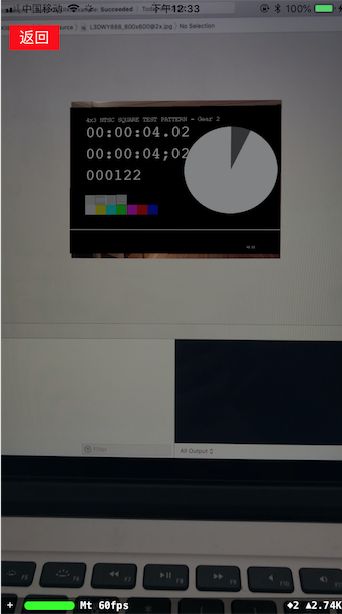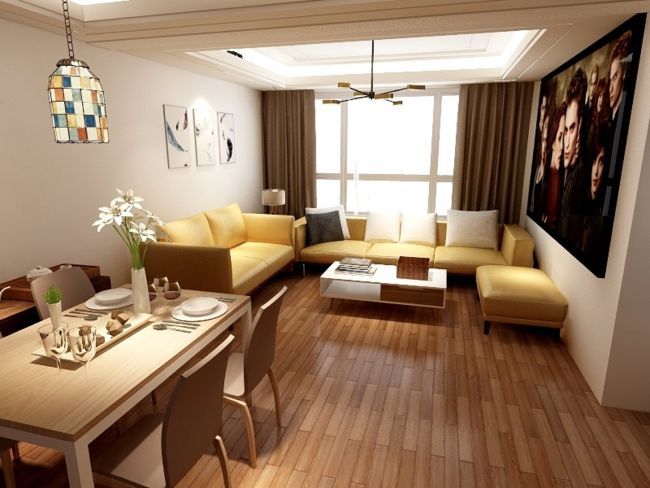AR系列的开篇。本系列打算由上而下的学习AR的各种实现方式和原理。会涉及到音视频、视频照片滤镜和OpenGLES相关的知识。
让我们来定义一个需求,AR识别固定标记,识别后根据识别标记的位置计算旋转、平移和缩放矩阵确定播放器视口位置和大小,支持播放网络视频。当然实现的方式有多种:
- 通过第三方 Vuforia可以实现AR识别功能,官方demo介绍了本地视频播放的方法,但是不支持流媒体播放。流媒体播放视频可以用AVPlayer加载URL,并添加AVPlayerItemOutput 为AVPlayerItem的output。调用下面的API获取视频帧缓存。
/*!
@abstract检索适合在指定的项目时间显示的图像,并将图像标记为已获取。
@discussion
完成后,客户端负责在返回的CVPixelBuffer上调用CVBufferRelease。
通常,您将调用此方法来响应CVDisplayLink回调或CADisplayLink委托调用,并且hasNewPixelBufferForItemTime:也返回YES。
从copyPixelBufferForItemTime:itemTimeForDisplay:中检索的缓冲区引用本身可能为NULL。 为NULL时表明该CMTime没有像素缓冲区需要显示。
*/
- (nullable CVPixelBufferRef)copyPixelBufferForItemTime:(CMTime)itemTime itemTimeForDisplay:(nullable CMTime *)outItemTimeForDisplay CF_RETURNS_RETAINED;
Vuforia 类似的详细实现之后专门开篇讨论。
- ARKit实现识别图片。这是iOS 11.3推出的新功能。具体API如下
/**
AR场景中要检测的图片
@discussion 如果设置detectionImages,ARKit将尝试检测指定的图像。当检测到图像时,
会回调 - (nullable SCNNode *)renderer:(id )renderer nodeForAnchor:(ARAnchor *)anchor方法。anchor 是ARImageAnchor。
*/
@property (nonatomic, copy, nullable, readwrite) NSSet *detectionImages API_AVAILABLE(ios(11.3));
本篇主要讨论ARKit实现方案。
先看几个11.3 新特性
iOS 11.3 新特性之一 ARPlaneDetectionVertical 这是一个NS_OPTIONS位移枚举。用于检测场景中的垂直平面。
iOS 11.3 新特性之二: ARReferenceImage API_AVAILABLE(ios(11.3))
ARReferenceImage 是识别图像的模型类,提供了三个创建方法。init和new都设置为不可用。
// CGImageRef生成ARReferenceImage识别模型,注意physicalWidth的单位是:米 (meters)
- (instancetype)initWithCGImage:(CGImageRef)image orientation:(CGImagePropertyOrientation)orientation physicalWidth:(CGFloat)physicalWidth NS_SWIFT_NAME(init(_:orientation:physicalWidth:));
// 从CVPixelBufferRef生成ARReferenceImage识别模型
- (instancetype)initWithPixelBuffer:(CVPixelBufferRef)pixelBuffer orientation:(CGImagePropertyOrientation)orientation physicalWidth:(CGFloat)physicalWidth NS_SWIFT_NAME(init(_:orientation:physicalWidth:));
// 从指定的图片包里加载一套识别图,返回一个ARReferenceImage识别模型 的NSSet。
+ (nullable NSSet *)referenceImagesInGroupNamed:(NSString *)name bundle:(nullable NSBundle *)bundle;
/** Unavailable */
- (instancetype)init NS_UNAVAILABLE;
+ (instancetype)new NS_UNAVAILABLE;
- iOS 11.3 新特性之三: ARWorldTrackingConfiguration的新属性detectionImages 。把我们上面创建的ARReferenceImage识别模型组赋值给detectionImages。
@property (nonatomic, copy, nullable, readwrite) NSSet *detectionImages API_AVAILABLE(ios(11.3));
- iOS 11.3 新特性之四: SCNMaterial对象的contents可以直接添加AVPlayer对象作为纹理源。(iOS 11.3之前可以添加SpriteKit scene add child SKVideoNode (SKVideoNode may creat with AVPlayer))
@property(nonatomic, retain, nullable) id contents;
SCNMaterial *materialVideoFrame = [SCNMaterial material];
materialVideoFrame.diffuse.contents = self.playerManger.player;
根据上诉四条新功能,可以实现AR视频播放。下面上代码:
- 配置 ARWorldTrackingConfiguration 添加识别图, 并runWithConfiguration。
- (void)resetTracking
{
/**
ARSessionRunOptions 也是一个NS_OPTION。
ARSessionRunOptionResetTracking 每次调用重新配置识别。
ARSessionRunOptionRemoveExistingAnchors 重新配置时删除之前存在的Anchors
如果不配置options:默认保留现有的Anchors
*/
[self.sceneView.session runWithConfiguration:self.arConfig options:ARSessionRunOptionResetTracking | ARSessionRunOptionRemoveExistingAnchors];
}
- (ARWorldTrackingConfiguration *)arConfig
{
if (!_arConfig) {
_arConfig = [[ARWorldTrackingConfiguration alloc] init];
//iOS 11.3 新特性之一: ARPlaneDetectionVertical API_AVAILABLE(ios(11.3)) = (1 << 1)
/** Plane detection determines vertical planes in the scene. */
if (@available(iOS 11.3, *)) {
// 由于我们识别的是图像平面,这里不设置其他平面的识别。
// _arConfig.planeDetection = ARPlaneDetectionHorizontal | ARPlaneDetectionVertical;
NSString *resourcePath = [[NSBundle mainBundle] resourcePath];
NSString *filePath = [resourcePath stringByAppendingPathComponent:@"[email protected]"];
_deImage = [UIImage imageWithContentsOfFile:filePath];
//iOS 11.3 新特性之二: ARReferenceImage API_AVAILABLE(ios(11.3))
ARReferenceImage *referenceDetectedImg = [[ARReferenceImage alloc] initWithCGImage:_deImage.CGImage orientation:1 physicalWidth:0.1];
// iOS 11.3 新特性之三: ARWorldTrackingConfiguration的新属性
[_arConfig setDetectionImages:[NSSet setWithObject:referenceDetectedImg]];
}
}
return _arConfig;
}
- 识别成功返回锚点,添加node,矩阵变换。
#pragma mark - ARSCNViewDelegate
// 重写以根据anchor创建添加到当前session中的node。识别水平垂直平面或图像返回的锚点。
- (SCNNode *)renderer:(id)renderer nodeForAnchor:(ARAnchor *)anchor {
// 当返回ARImageAnchor时,说明识别到图片了。
if (![anchor isMemberOfClass:[ARImageAnchor class]]) {
return [SCNNode node];
}
// 这里配置我们播放视频相关的node。
// 自定义SCNGeometry(SCNGeometrySource, SCNGeometryElement) 设置视频node
DKVideoPlane *videoGeometry = [DKVideoPlane planeWithType:DKVideoPlaneHorizontal width:0.1 length:0.07];
videoGeometry.materials = @[self.materials[DKARPlayerMaterialTypeVideo]];
_videoNode = [SCNNode nodeWithGeometry:videoGeometry];
//worldTransform 和 transform 的区别:worldTransform相对于根节点的旋转平移缩放矩阵,transform和position同时设置,共同作用与node的变换。
SCNMatrix4 transM = SCNMatrix4FromMat4(anchor.transform);
_videoNode.worldTransform = transM;
}
- (NSMutableArray *)materials
{
if (!_materials) {
_materials = [NSMutableArray array];
SCNMaterial *materialVideoFrame = [SCNMaterial material];
/**
SKScene *ss = [SKScene sceneWithSize:CGSizeMake(100, 100)];
SKVideoNode *vn = [SKVideoNode videoNodeWithAVPlayer:self.playerManger.player];
[ss addChild:vn];
materialVideoFrame.diffuse.contents = ss;
*/
// iOS 11.3 新特性之四: SCNMaterial对象的contents可以直接添加AVPlayer对象作为纹理源。
materialVideoFrame.diffuse.contents = self.playerManger.player;
[_materials insertObject:materialVideoFrame atIndex:DKARPlayerMaterialTypeVideo];
}
return _materials;
}
- 加上简单的播放逻辑,点击播放暂停,快进快退seek
- (void)setupRecognizers {
// Single tap will insert a new piece of geometry into the scene
UITapGestureRecognizer *tapGestureRecognizer = [[UITapGestureRecognizer alloc] initWithTarget:self action:@selector(onPlayerVideo:)];
tapGestureRecognizer.numberOfTapsRequired = 1;
[self.sceneView addGestureRecognizer:tapGestureRecognizer];
UIPanGestureRecognizer *panRecognizer = [[UIPanGestureRecognizer alloc]initWithTarget:self action:@selector(panDirection:)];
[panRecognizer setMaximumNumberOfTouches:1];
[panRecognizer setDelaysTouchesBegan:YES];
[panRecognizer setDelaysTouchesEnded:YES];
[panRecognizer setCancelsTouchesInView:YES];
[self.sceneView addGestureRecognizer:panRecognizer];
}
// 添加手势控制播放暂停
- (void)onPlayerVideo:(UITapGestureRecognizer *)sender {
if (sender.state == UIGestureRecognizerStateEnded) {
if ([self.playerManger getStatus] == PLAYING) {
[self pause];
}else{
[self play];
}
}
}
// 添加手势控制播放进度
- (void)panDirection:(UIPanGestureRecognizer *)pan {
CGPoint veloctyPoint = [pan velocityInView:self.sceneView];
// 判断是垂直移动还是水平移动
switch (pan.state) {
case UIGestureRecognizerStateBegan: { // 开始移动
// 使用绝对值来判断移动的方向
CGFloat x = fabs(veloctyPoint.x);
CGFloat y = fabs(veloctyPoint.y);
if (x > y) { // 水平移动
self.panDirection = DKARPanDirectionHorizontalMoved;
CMTime time = self.playerManger.player.currentTime;
self.sumTime = time.value/time.timescale;
}
break;
}
case UIGestureRecognizerStateChanged: {
switch (self.panDirection) {
case DKARPanDirectionHorizontalMoved:{
[self horizontalMoved:veloctyPoint.x];
break;
}
default:
break;
}
break;
}
case UIGestureRecognizerStateEnded: {
switch (self.panDirection) {
case DKARPanDirectionHorizontalMoved:{
[self.playerManger seekTo:self.sumTime];
self.sumTime = 0;
break;
}
default:
break;
}
break;
}
default:
break;
}
}
- 基本完成开篇提出的需求。
开发过程中需要注意的点:
- 需要对纹理坐标系和顶点坐标系有清晰的理解。
- 注意node的SCNGeometry绘制方向。
待完善的地方:
hitTest: 不能击中已添加的ARImageAnchor,识别平面添加的anchor可以正确击中。接下来打算自定义点击区域计算方法。
SCNText没有正确显示到scene中
有不明白的欢迎讨论。本篇demo
识别标记图:
// 要识别的图片name。也可以定义图片包。
#define TrackImage @"aaa.jpg"

